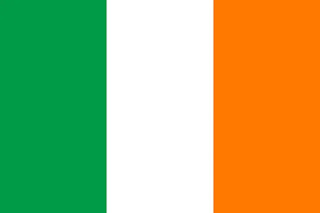 |
| Irland Das Irisch-Gälische tut sich trotz staatlicher Förderung schwer gegen das Englische. |
Irisch-Gälisch gehört zu den noch lebenden keltischen Sprachen. Es ist quasi "modernes Keltisch".
Alle modernen keltischen Sprachen sind inselkeltische Sprachen, weil das Festlandskeltische ausgestorben ist.
Berühmte Beispiele für das Festlandskeltische sind Gallisch [p-Keltisch], Galatisch [p-Keltisch; aus Anatolien] und Keltiberisch [q-Keltisch; damit Ausnahme auf dem Festland]). Die Keltiberer gelten eigentlich als "Mischvolk" aus Kelten und Iberern, die Sprache ist aber fast rein Keltisch.
Die inselkeltischen Sprachen bilden einen britannischen und einen goidelischen Zweig.
Zum britannischen Zweig [p-Keltisch] gehören z. B. das Walisisch-Kymrische, das Kumbrische, das Kornische und das Bretonische. Bretonisch ist auch eine Inselkeltische Sprache, obwohl es auf dem Festland gesprochen wird, weil es von einer keltischen Neubesiedelung von den Inseln her stammt.
Zum goidelischen Zweig [q-Keltisch] gehören das Irisch-Gälische, Schottisch-Gälisch und Manx (Isle of Man). Die schottisch-gälische Sprache kam durch Besiedlung aus Irland nach Schottland.
A
a aithint vb to recognise
a dó nm two
ab nm3 abbot
abair vb recite [prayer], say, suppose [mathematics]
abairt nf2 phrase, sentence
ábalta vb able
ábaltacht nf3 ability
abhac nm dwarf
abhaile adv home, homewards
abhainn nf river
ábhar nm subject, topic
abhatár nm4 avatar
abhlann nf2 host [religion]
acadamh nm1 academy
ach but
achainí nf petition
achar nm1 area (maths), distance, duration,
extent, period
achoimre nf summary, synopsis
achomharc nm1 appeal (legal); vb appeal (legal)
achrannach adj confrontational, quarrelsome
aclaí adj agile
aclaigh vb exercise, flex, limber
acmhainn nf2 capacity, endurance, equipment,
means, resources
acmhainní nf2 capabilities, resources
acra nm4 acre
adamh nm1 atom
adamhach adj atomic
ádh nm fortune, luck
adhain vb ignite, inflame, kindle
adharc nf2 erection, horn
adhlaic vb to bury [after death]
adhmad nm timber, wood
ádhúil adj fortunate, lucky
admhaigh vb acknowledge, admit, confess
admháil nf3 acknowledgement, acknowledgment, receipt
aduain adj apart, strange, unfamiliar
ae nm4 liver
aer nm air
aerach adj gay
aerfort nm airport
aeríontóir nm3 air freshner
aerlíne nf4 airline
aeróg nf2 aerial, antenna
Aetópach adj Ethiopian
áfach adv however
ag prep at, by, with
ag caoineadh vb crying
ag dul vb going
ag fanacht vb waiting
1
Dia dhuit. Hallo.
Conas tá tú? Wie geht es Ihnen?
Dia is Muire dhuit. Hallo. (Erwiderung)
Tá mé go maith. Mir geht es gut.
Cad is ainm duit? Wie ist Ihr Name?
(Is) mise ... Ich bin ...
Tá mé i mo chónaí i ... Ich lebe/wohne in ...
le do thoil bitte
Go raibh maith agat. Danke.
Slán. Wiedersehen.
Tar isteach. Komm(t) herein.
Tá fáilte romhat. Bitte! Gerne!
Go raibh maith agat. Danke.
Tá sé fuar/tirim. Es ist kalt/trocken.
Tá, cinnte. Ja, genau. („tatsächlich“)
Seo do sheomra. Das ist Ihr Zimmer.
Tá an tae réidh. Der Tee ist fertig.
2
Is ... mé. Ich bin (ein) ...
An ... tu? Bist du (ein) ... ?
Is ea. Ja.
Ní hea. Nein.
2
Is ... mé. Ich bin (ein) ...
An ... tu? Bist du (ein) ... ?
Is ea. Ja.
Ní hea. Nein.
Cad as duit? Woher kommst du?
As ... Von ...
Cad is ainm (m) duit? Wie ist dein Name?
le do thoil bitte
Áine Ní Chonaill is ainm dom. Mein Name ist Ann O'Connell.
Cad as duit? Woher kommst du?
As Trá Li. Aus (von) Tralee.
Ach tá mé i mo chónaí i gCorcaigh anois. Aber ich lebe jetzt in Cork.
I gcathair (f) Chorcaí In Cork City?
is ea. Ja. ("Das ist es.")
As ... Von ...
Cad is ainm (m) duit? Wie ist dein Name?
le do thoil bitte
Áine Ní Chonaill is ainm dom. Mein Name ist Ann O'Connell.
Cad as duit? Woher kommst du?
As Trá Li. Aus (von) Tralee.
Ach tá mé i mo chónaí i gCorcaigh anois. Aber ich lebe jetzt in Cork.
I gcathair (f) Chorcaí In Cork City?
is ea. Ja. ("Das ist es.")
Keine Kommentare:
Kommentar veröffentlichen